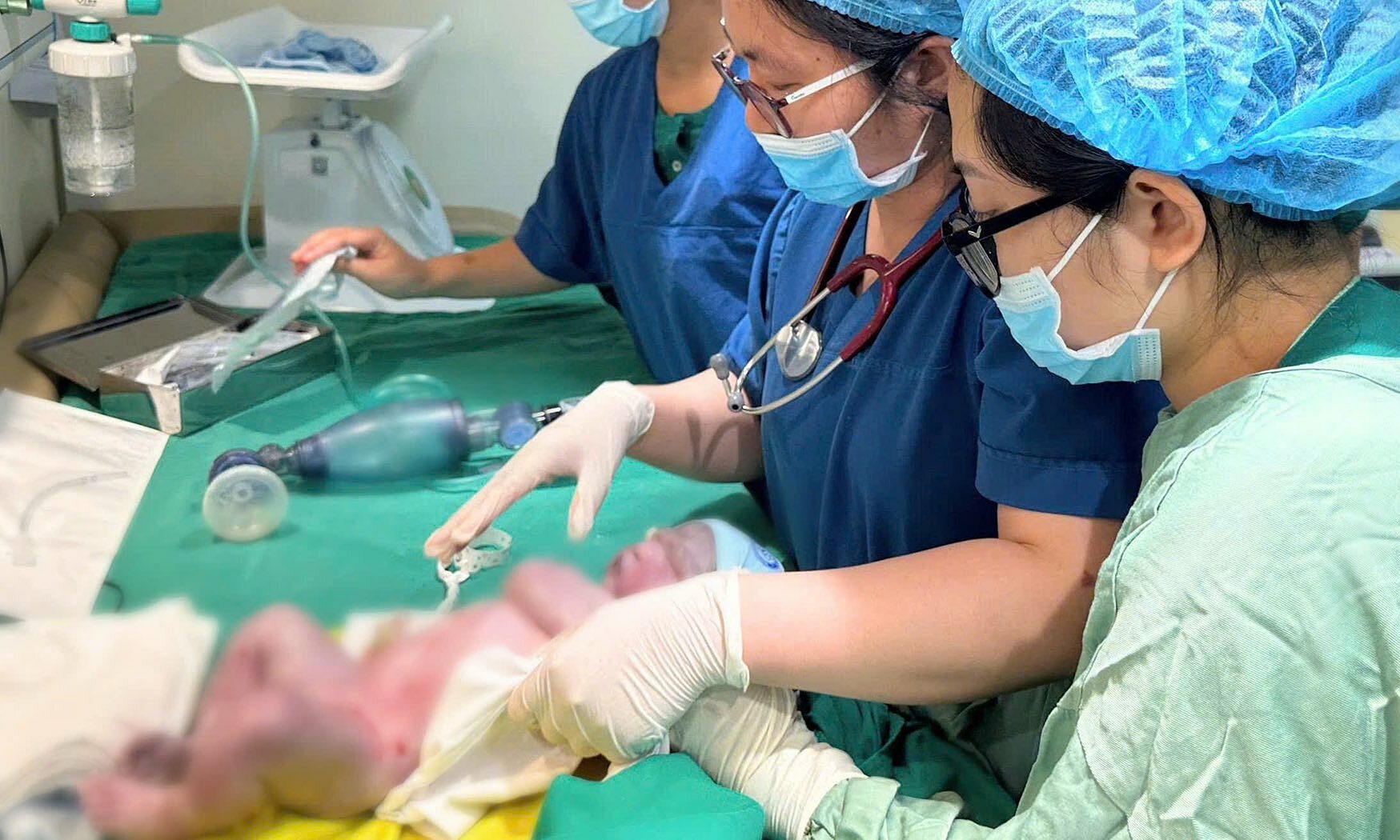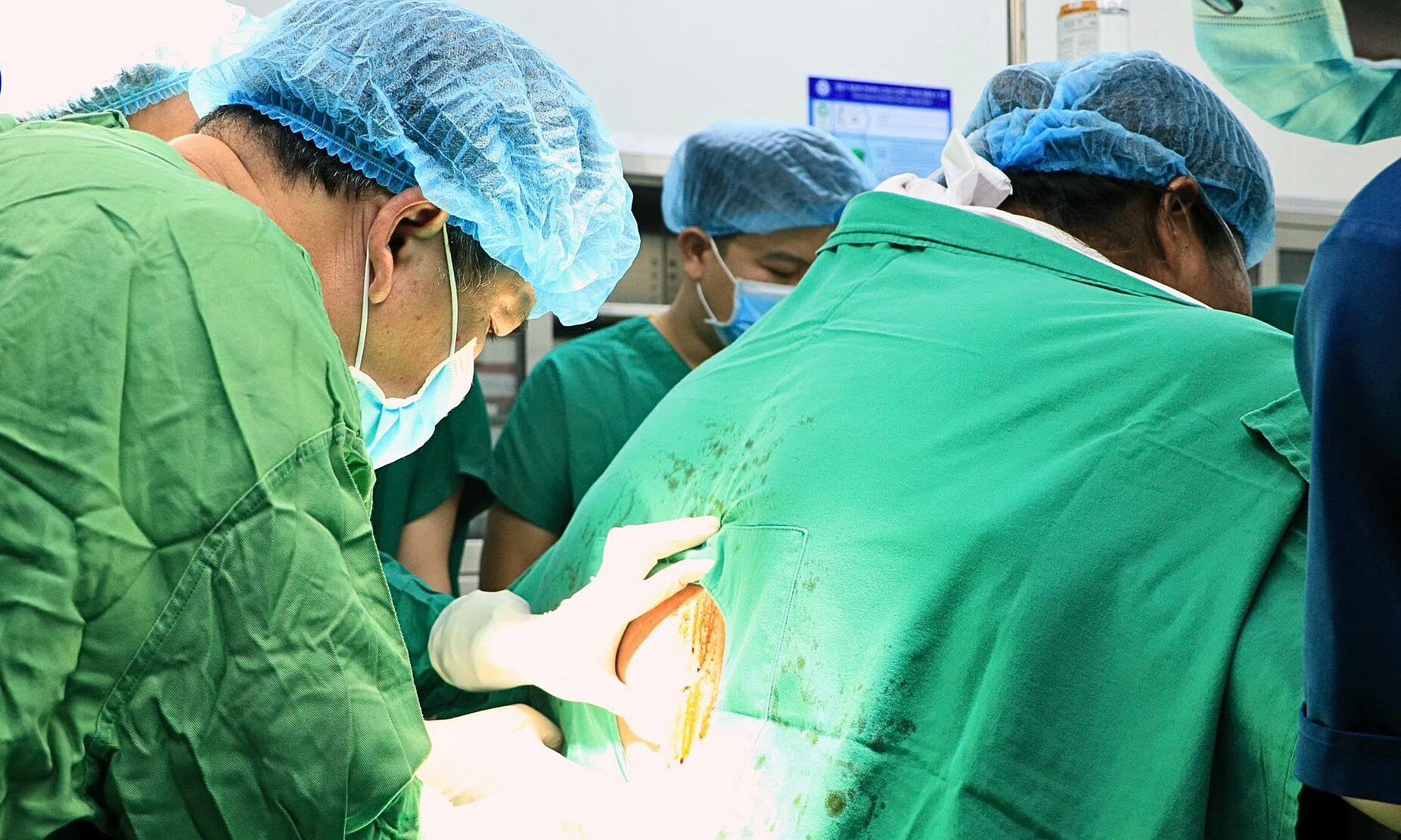The one-hour surgery on 13/8 resulted in the birth of a healthy baby boy weighing 3.4kg.
The woman, from Phu Tho, suffered from a metabolic disorder that caused her weight to increase uncontrollably from 140kg before pregnancy to 178kg at the time of delivery. Her pre-eclampsia and gestational diabetes made a natural birth impossible. Even a c-section presented numerous risks, from anesthesia and surgery to post-operative recovery.
Doctors at the National Hospital of Obstetrics and Gynecology determined that delaying the c-section could worsen the prognosis for both mother and child, so they decided on an emergency procedure. The team prepared for two scenarios: regional anesthesia (spinal or epidural) and general anesthesia.
Dr. Bach Minh Thu, head of the Department of Anesthesia and Resuscitation, explained that with obese patients, the thick layer of fat obscures anatomical landmarks and increases the distance from the skin to the subarachnoid space. Using ultrasound, doctors found this distance to be over 11cm, far exceeding the maximum length of the anesthesia needle, making regional anesthesia unfeasible.
When spinal anesthesia proved impossible, the team opted for general anesthesia. This method also carried risks, particularly the risk of failed ventilation after the patient lost the ability to breathe independently.
 |
The healthy newborn. Photo: Hospital provided |
The healthy newborn. Photo: Hospital provided
"Even a slight error or difficulty during anesthesia could cause severe oxygen deprivation for both mother and baby, threatening their lives," Dr. Thu said.
Doctors conducted a thorough pre-operative examination, assessing respiratory function, airways, and related issues to develop a safe approach. All equipment, from camera lighting systems and endoscopes to endotracheal tubes and tracheotomy kits, were prepared. The team also precisely calculated drug dosages based on height and weight to ensure sufficient anesthesia and muscle relaxation while avoiding hypotension, a common complication in obese patients.
Dr. Dang Quang Hung, deputy head of the Department of Obstetric Pathology and the surgeon who performed the c-section, said the biggest challenge was the excessively thick abdominal wall, which made it difficult to access the uterine muscle and deliver the baby. The prolapsed abdominal fat tissue made the surgical maneuvers far more complex.
The pre-existing hypertension and diabetes significantly increased the risk of wound infection and post-operative respiratory complications. The large fat mass and the fetus pushed the diaphragm upwards, restricting lung expansion and increasing the risk of lung collapse and cardiopulmonary complications.
The surgery required seamless coordination between the anesthesia and surgical teams for a swift and safe delivery while alleviating the hemodynamic burden on the mother.
 |
Doctors attempted regional anesthesia, but the available needles were too short. Photo: Hospital provided |
Doctors attempted regional anesthesia, but the available needles were too short. Photo: Hospital provided
Dr. Hoang Thi Ngan from the Department of Anesthesia and Resuscitation noted that with obese patients, emergence from anesthesia, weaning from the ventilator, and extubation also require careful management. The patient's weight and high body fat percentage significantly increased the risk of lung collapse and reduced ventilation after extubation.
In the post-operative room, the patient was ventilated, then given muscle relaxants and extubated following standard procedures. Immediately after extubation, she received ventilation support and breathing exercises to optimize blood oxygenation and prevent lung collapse.
The patient responded well and was transferred to the Intensive Care Unit for further monitoring. Her husband shared that throughout the pregnancy, his wife strictly adhered to a special diet, limiting sugar and controlling her food intake, but still gained significant weight.
"I am incredibly grateful to the doctors for ensuring a safe delivery for my wife and child," he said.
Le Nga












